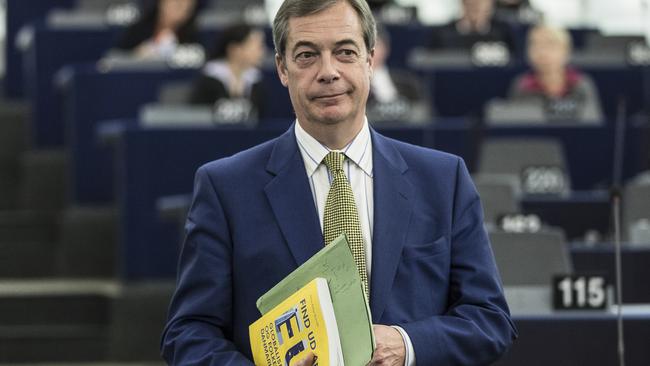Nigel Farage leaves UKIP over far right turn
UK Independence Party co-founder Nigel Farage has resigned from the party over its embrace of far-right activists.

UK Independence Party co-founder Nigel Farage has resigned from the party he used to lead, over its embrace of far-right activists.
In a column for The Daily Telegraph newspaper, Mr Farage wrote that he no longer recognised the party that he had turned into a force in British politics
“With a heavy heart, I am leaving UKIP. It is not the Brexit party our nation so badly needs,” Mr Farage wrote.
Mr Farage, who quit as party leader in 2016 but stayed on as a card-carrying member of the pro-Brexit party, fell out with the current leadership after it appointed far-right activist and convicted criminal Tommy Robinson as an adviser last month.
Mr Farage, who has himself been accused of fomenting far-right views, said that at a UKIP conference this year he was confronted by “several angry young men … who all seemed to be obsessed with Islam and Tommy Robinson”.
“The party of elections is quickly becoming a party of street activism, with our members being urged to attend marches rather than taking the fight to the ballot box,” he wrote.
Mr Farage co-founded the party and has represented UKIP on the European parliament -- a job he will lose when Britain withdraws from the European Union.
He is also a radio host in Britain and a commentator for Fox News, building on a bond with President Donald Trump forged during the US election campaign.
Brexit has been the 54-year-old former trader’s dream ever since leaving the Conservatives in 1992 following the signing of the Maastricht Treaty, which deepened European integration.
Farage has spent nearly three decades undermining European institutions and mocking its leading lights, a mission that culminated with the 2016 referendum to leave the EU.
He stepped down as party leader after the vote, explaining that “my political ambition has been achieved”.
He will stay on as deputy chairman of Leave Means Leave, a pro-Brexit campaign group.
Mr Farage was born in 1964 to an affluent family in Kent, southeast England. His father was a stockbroker and an alcoholic, and his parents divorced when he was five.
He was educated at one of England’s top private schools, Dulwich College in London, before becoming a commodities trader.
Mr Farage has had three brushes with death.
In 1985, he was hit by a car after a night out, suffered serious head and leg injuries. Months later, he had a cancerous testicle removed.
Once recovered, he married his nurse, and the couple had two sons. Following their divorce in 1997, Mr Farage married second wife Kirsten Mehr, a German, with whom he has two daughters.
The couple has since announced they are separating.
Mr Farage’s political destiny was cast with the co-founding of UKIP in 1993, and with his election to the European parliament in 1999, aged 35.
He became UKIP’s leader in 2006 before standing down in 2009 and then being re-elected the following year, stamping his charisma and anti-establishment humour on the party as it soared in popularity.
The party won the most British seats in European parliament elections in 2014, although Mr Farage himself never managed to get elected as an MP at home despite repeated attempts.
With the party’s image and Mr Farage becoming intertwined, and with the Brexit vote achieved, UKIP faced a vacuum of leadership and identity.
Much of Mr Farage’s appeal lay with his “everyman” image, the result of many hours spent swilling pints of ale down at the pub, cigarette in hand.
Voted “Briton of 2014” by The Times, Mr Farage maintained a high profile before the referendum but was kept out of the official pro-Brexit campaign, which feared his brand was too divisive.
The Brexit vote helped vindicate some of Mr Farage’s methods, but came at a price. “During the referendum I said I wanted my country back ... now I want my life back,” he said when he resigned as leader two years ago.
Mr. Farage led the party from 2006 to 2009, and again from 2010 to 2016.
AP


